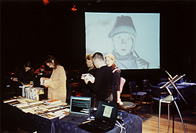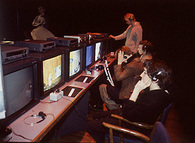(Marshall McLuhan, Understanding Media: the extensions of man)
As McLuhan writes in Understanding Media, technological developments affect our entire system of living, from the way we communicate, to the speed at which we move, to how we understand and relate to our social and spatial environment. Situating Technologies was a symposium and video program critically assessing these changes by looking at the shifting surface of the technoscape. Moving away from polemic predictions of utopia or dystopia, the event concentrated on technologies in context, localizing them in the way they operate in everyday life. The day was devoted to understanding the social spaces and relations evolving out of communication networks and the impact they have on our culture.
Speakers
Irina Aristarkhova (RUS) is author of the essay Cyber-Jouissance and Senior Lecturer at the Department of Art Theory and Art History at Lasalle-Sia College of Arts, Singapore. She is head of the Centre for Women’s Studies in Moscow and an editorial board member of the art journal, Radek: Art, Theory, Politics.
Download Irina Aristarkhova’s lecture here [PDF]
The Bureau of Inverse Technology (BIT) (USA/UK/AU), represented by Kate Rich The Bureau is an information agency servicing the Information Age (formed Melbourne 1991, incorporated Delaware 1999). BIT agents are involved in the design, engineering, critical deployment and media documentation of a series of BIT techno-products. Some of the Bureau’s recent technological developments have been tracking and data devices such as the SUICIDE BOX, the BIT PLANE and the BANG BANG camera network.
Karin Spaink (NL) is a media theorist who has written extensively on technology, health and bodies. As a media activist she has fought for and written about freedom of speech on the net. She is a regular contributor to the magazine “De Groene Amsterdammer”, and is author of Aan hartstocht geen gebrek (‘Passionate imperfections’).
Frank Webster (UK) is Professor of Sociology in the Department of Cultural Studies and Sociology at the University of Birmingham. He is co-author with Kevin Robins of Times of the Technoculture: From the information society to virtual life (Routledge: 1999), a book examining the social implications of the information age.
Video Program
BUREAU OF INVERSE TECHNOLOGY, Bit Plane / USA / 1998 JOSEPH HYDE, Zoetrope / UK / 1998 / TRAN T. KIM-TRANG, Ocularis: Eye Surrogates / UK / 1997 / Ciara Finnegan, Switch / UK / 1997 / Timothy Leary / EZTV, Outside Looking in / USA / 1996 / George Barber, The story of wash and go / UK / 1995 / Kristin Lucas, Host / USA / 1997 /
Situating Technologies was a part of the Mediated Image Series which was a series of lectures and presentations programmed by De Geuzen looking at how images are constructed, interpreted, manipulated and received. Besides examining how images are made and displayed, the series explored key figures who have shaped contemporary media discourse, such as Guy Debord, Jean Baudrillard, Marshall McLuhan and Michel de Certeau.

 Symposium with: Irina Aristarkhova, Frank Webster, Kate Rich (representing BIT), Thomas Buxo and Karin Spaink, De Balie, Amsterdam [2000]
Symposium with: Irina Aristarkhova, Frank Webster, Kate Rich (representing BIT), Thomas Buxo and Karin Spaink, De Balie, Amsterdam [2000]


